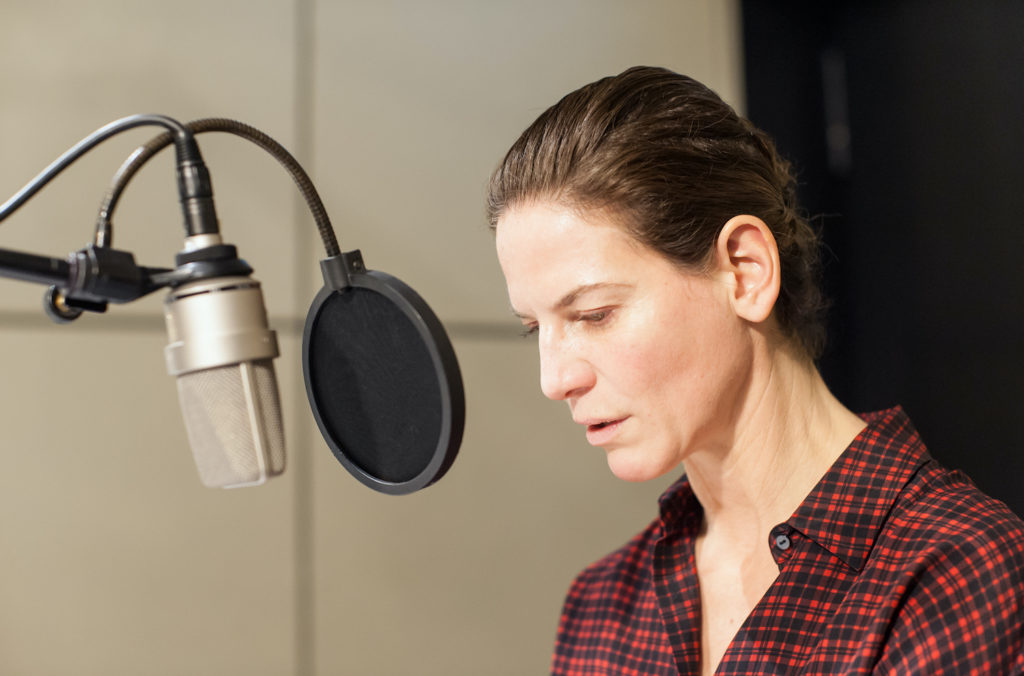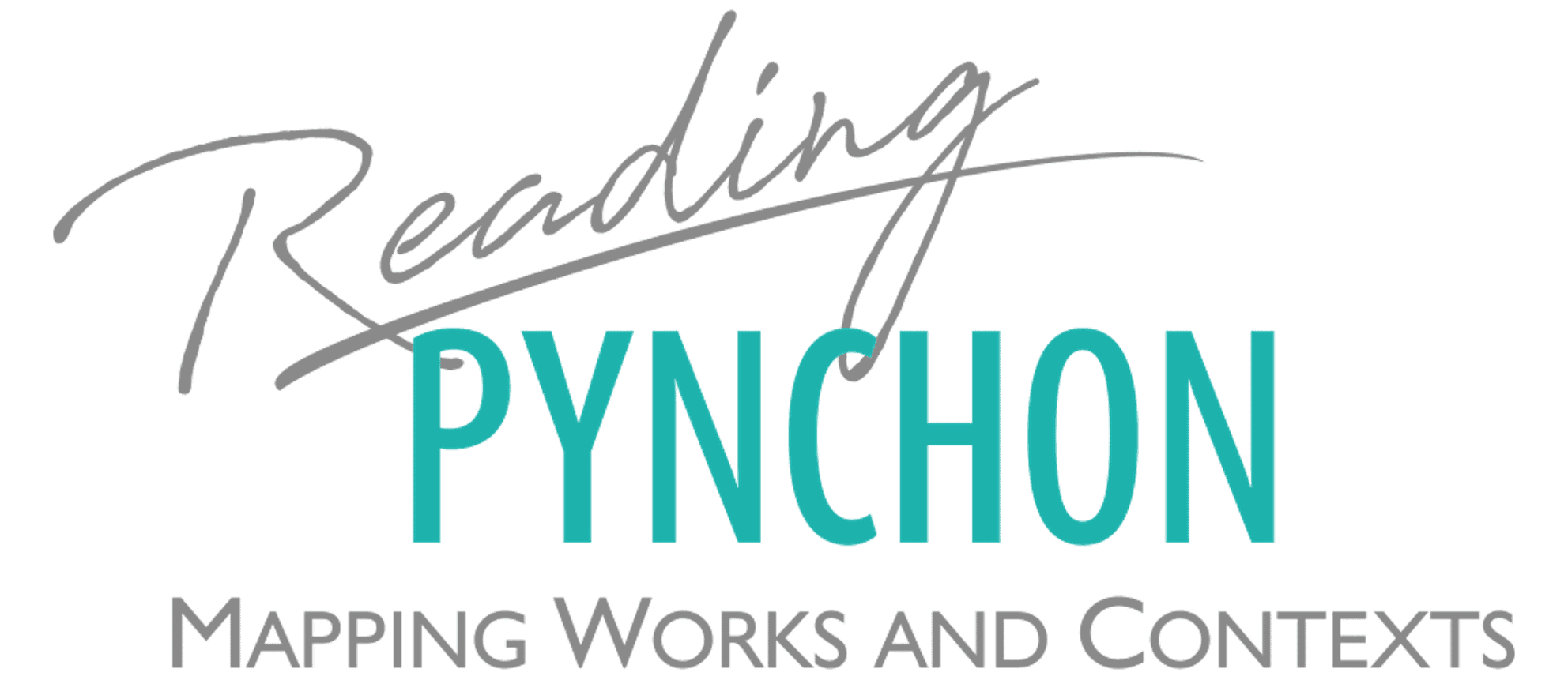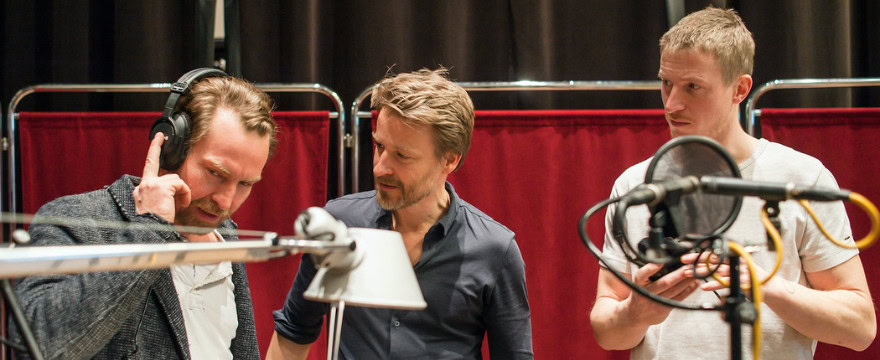Pynchon erzählt […] über ‘alles’ in der Welt: Auflösung, Anarchie, Gesetzlosigkeit, Macht und Kontrolle, vom Kampf um Freiheit und Identität, von der Dominanz gnadenloser Technologie.
Interview with Klaus Buhlert, by Gitta Deutz
Pynchon tells us about ‘everything’: about dissolution, anarchy, lawlessness, power and control, about the fight for freedom and identity, about the dominance of ruthless technology.
Interview with Klaus Buhlert, by Gitta Deutz; all translations in this post by Utz Klöppelt
Radio play of Thomas Pynchon’s Gravity’s Rainbow premieres in April 2020
“Hhahh,” Pirate in a voiceless roar watching his breath slip away over the parapets, “hhaahhh!”
Thomas Pynchon in Gravity’s Rainbow (1973: 6)
This is Capt. Geoffrey (“Pirate”) Prentice on his rooftops in London – about to prepare his “banana breakfast” and watch the vapor trail of a V2-rocket, “the new, and still Most Secret, German rocket bomb” (Pynchon 1973: 6).
You can listen to that “voiceless roar” right here, performed by Franz Pätzold for the first radio play ever of Gravity’s Rainbow in its German version – officially licensed by Thomas Pynchon!

Will the radio play open with that “roar”? Did its director, Klaus Buhlert, choose to open the approximately 14-hour-long performance with the very stuff that radio plays are made of – with a sound, with a human sound, with a breath about to fall into words and voice once the vocal chords do their trick?
If you want to know, make sure to tune in – in less than two weeks from now: Die Enden der Parabel premieres on the German radio station SWR2 (Südwestrundfunk) on a Friday night: 17 April, 2020.
And, if you miss it, or do not understand German, make sure to come back here sometime, to read my review on Buhlert’s adaptation of Pynchon’s 1973 novel. For the time being, however, let me introduce you to the play and its crew.
Broadcasts of Die Enden der Parabel / Gravity’s Rainbow
First things first, however – most importantly, for those of you who understand German, or, even if you do not understand it and want to get a feeling of the atmosphere being created by Buhlert and his crew – tune in online on one of the German radio stations or buy the CDs* later:
- Premieres: 17 April, 2020, 8:03 pm – 6:00 am (18 April) and 18 April, 2020, 8:03 pm – 4:00 am (19 April) on the German SWR2 (all CEST).
- Second presentation: 18 April, 8:05 pm – 6:00 am (CEST) till 5 May, 2020, on the German radio station Deutschlandfunk. See here for the dates and times of the Deutschlandfunk broadcasts.
- Streaming available (no downloads) from 18 April – 26 April, 2020 on the SWR2 radio app and on Deutschlandfunk.
- CDs available first on 24 April, 2020: Thomas Pynchon. Die Enden der Parabel. Gravity’s Rainbow. Hörspiel, script, director, and music: Klaus Buhlert, produced by SWR2 and Deutschlandfunk in cooperation with HÖRBUCHHAMBURG, approx. 14 hours, April 2020.*
* Advertisement: unpaid, unsponsored; part of editorial content here.
The Crew
According to press releases about 40 people were part of the crew producing Die Enden der Parabel / Gravity’s Rainbow. Unfortunately, I cannot introduce all of them here – for lack of information and for the sake of brevity, but, almost needless to say here: be sure that every single member of the crew is important for the overall result, or, as Vidina Popov who gives voice to Maggie Dunkirk and many other minor characters has it:
The biggest challenge was to contribute little mosaic stones, at some point accumulating to a gigantic piece of art, the size, power, effects, and necessities of which I can hardly estimate.
Vidina Popov
Now, let me introduce you to some of the crew members and what they say about the project:
The Director
It all started with Klaus Buhlert, the director of the radio play. In an interview with Gitta Deutz he tells us that he had acquired Gravity’s Rainbow in the middle seventies, not too long after the publication of the novel, had read a few chapters and had put the novel back on his bookshelf – he had not been ready for the novel yet.

Meanwhile Austrian Nobel Prize winning author Elfriede Jelinek and Thomas Piltz had translated Gravity’s Rainbow: the script of Buhlert’s radio play is based on the German version of Pynchon’s novel: Die Enden der Parabel (1981; also see my blog entry on Jelinek and Die Enden der Parabel).
Now, about 45 years later and after 520 days of producing what he calls an “acoustic version of a road movie” – the radio play Die Enden der Parabel / Gravity’s Rainbow – Buhlert is an expert on Pynchon’s novel as Vidina Popov who impersonates Maggie Dunkirk in the radio play lets us know.
Buhlert is also an author, composer of theatre pieces, theatre and film director, director of radio plays, has received his (German) Ph. D. in acoustics, and was rewarded an award for his lifetime achievement by the German Schallplattenkritik. Together with Manfred Hess he produced James Joyce’s Ulysses for radio (2012). He was Guest Professor for electronic and computer music at the Technische Universität Berlin.
The Dramatic Advisor
Manfred Hess! He is the one who contacted Pynchon – in ways we cannot be sure of – and finally got permission to realize the project! For the first time ever Pynchon officially gave permission to “go ahead” with the project and publish an adaptation of Gravity’s Rainbow / Die Enden der Parabel.
Manfred Hess studied German Studies, Philosophy, Film, Theatre and TV at the Freie Universität Berlin, worked as dramatic advisor for the Theatre House in Essen, Germany (1997-1990) and, again, as dramatic advisor for radio plays (literature) and sound art at the German radio station Hessischer Rundfunk (1994-2011). Since 2011 he has been responsible for radio plays at the Südwestrundfunk (SWR) as chief dramatic advisor.
Together with Klaus Buhlert he produced Ulysses by James Joyce as a radio play and won the Deutscher Hörbuchpreis in the category “Best Radio Play” in 2013.
If you are familiar with German, listen to Klaus Buhlert and Manfred Hess’s discussion of contemporary challenges to acoustics (for radio productions): Pirat Prentice’ Paranoia oder Pynchon 2 Go. Ein audiophiles Werkstattgespräch mit Klaus Buhlert.
The narrator
Franz Pätzold as the narrator of more than a 1000 Pynchon pages thinks to find a voice for “Pynchon” was a challenge he happily accepted. Although in a brief interview he emphasizes that he as a narrator has to tell everything from a neutral perspective, according to Buhlert Pätzold also functions as a commentator for the radio play – being responsible for its dynamic rhythm and the feeling of being “on the road.” Listen and decide for yourself!
Slothrop
Golo Euler, German actor, gives voice to Tyrone Slothrop. In Buhlert’s (director) interpretation “Slothrop” is a blend of “sloth” and “entropy”, thus denoting the energetic state of a sloth. It is Euler’s first appearance in a radio play. In a brief interview he says he prefers the radio play to film, because the listener can picture the scenes herself or himself; the best in that regard, however, was to read a book! He sees Slothrop as a ball being played with and successively becoming aware of that until he decides to quit and let things go on without him.
Pointsman
Jens Harzer gives voice to Pointsman and is the third narrator. He has worked with Buhlert more than once and thinks that Buhlert has worked his way through Gravity’s Rainbow more intensely than through other novels Buhlert worked on.
Katje Borgesius
Bibiana Beglau who is narrator and impersonates Katje Borgesius read Gravity’s Rainbow in 2010. About Katje she says that she was like a soap bubble shimmering in all colors without having an inner core. According to her, Katje is the perfect spy since she is able to adapt to simply anything. Beglau likes Buhlert’s way of presenting literature like music.

Before listening to Die Enden der Parabel / Gravity’s Rainbow
Whenever we talk about adaptations of words into music, music into words, words into film, of words into words in another language etc. – at some point we come to the conclusion that a new piece of art is being born. Additionally, once you translate a genre into another genre you work within the confines and conventions of that other genre.
In that sense, I have written about and mentioned adaptations or translations of Gravity’s Rainbow before:
- Edward Bennett’s musical sketches of Gravity’s Rainbow on Twitter – see “Gravity’s Rainbow scored page for page. Musical sketches of Gravity’s Rainbow“ (26 July, 2019).
- Zak Smith’s pictures of Gravity’s Rainbow, drawn page for page – also see “Gravity’s Rainbow scored page for page. Musical sketches of Gravity’s Rainbow“ (26 July, 2019).
- Elfried Jelinek and Thomas Piltz’s tranlation of Gravity’s Rainbow – see “Elfriede Jelinek and Gravity’s Rainbow“ (5 March, 2019).
What happens then is communication: we watch, read, or hear something referring to and interpreting another piece of art – thus I am very curious about how Buhlert and his crew communicate with Gravity’s Rainbow by Pynchon, how characters are being portrayed, how sound comes into play.
Whatever we are possibly going to listen to – before Pynchon’s next birthday on 8 May this year – we can be sure of at least two things: Pynchon did not give permission to set the lyrics and poems in Gravity’s Rainbow to music and song. Additionally, while it is obvious that the text had to be shortened for the script of the radio play, according to Buhlert Pynchon insisted on keeping language considered obscene and on keeping obscene scenes without shortening them.
For his interpretation of Gravity’s Rainbow Buhlert on the one hand seems to stick to the classic interpretation of Gravity’s Rainbow as a “Parabel”, i. e. a story of the end of the Third Reich and anarchy at the end of the Second World War. On the other hand Buhlert insists on the relevance of Gravity’s Rainbow for the world today:
The former ‘displaced persons’ are the refugees of war zones today. Themes like ignorance, legal vacuums, violence, fake news, control of everything and everyone are extremely contemporary and threatening.
Klaus Buhlert, Interview with Gitta Deutz
I am very much looking forward to that production! I am curious: What will be the first sound or word of the radio play? Will it be the “voiceless roar” mentioned above? Or those famous first lines by Pynchon’s narrator:
A screaming comes across the sky. It has happened before, but there is nothing to compare it to now.
Pynchon in Gravity’s Rainbow (1973: 3)
How will the radio play end? With a screaming coming across the sky?
What are your questions to the radio play before listening? Post them in the comments’ section below!
Further Reading, Listening, and Watching
- Feature: Pynchons “Die Enden der Parabel” erstmals als Hörspiel, URL: https://www.swr.de/unternehmen/kommunikation/pressemeldungen/swr2-hoerspiel-pynchon-die-enden-der-parabel-114.html (Last access: 6 January, 2022).
- Video trailer to Die Ende der Parabel / Gravity’s Rainbow: Pynchons “Die Enden der Parabel” erstmals als Hörspiel, URL: https://www.swr.de/unternehmen/kommunikation/pressemeldungen/swr2-hoerspiel-pynchon-die-enden-der-parabel-114.html (Last access: 6 January, 2022).
- Klaus Buhlert (director) on his radio play: Denis Scheck. “Hörspielregisseur Klaus Buhlert über sein Hörspiel ‘Die Enden der Parabel’ nach Thomas Pynchon”, URL: https://www.swr.de/swr2/hoerspiel/hoerspielregisseur-klaus-buhlert-ueber-sein-hoerspiel-die-enden-der-parabel-nach-thomas-pynchon-100.html (Last access: 6 January, 2022).
- Buhlert and Hess on contemporary challenges to acoustics: Hess, Manfred and Klaus Buhlert (2019). Pirat Prentice’ Paranoia or Pynchon 2 Go. Ein audiophiles Werkstattgespräch mit Klaus Buhlert, URL: https://www.swr.de/swr2/hoerspiel/pynchon-100~detailPage-3-0a9443d768a41f91273d6f15857d941e2563fbe4.html (Last access: 6 January, 2022).
- German translation of Gravity’s Rainbow: Pynchon, Thomas (1981). Die Enden der Parabel, translated by Elfriede Jelinek and Thomas Piltz, Reinbek bei Hamburg; Rowohlt Verlag.
Credits
- Gitta Deutz. “Interview mit Klaus Buhlert”, URL: http://www.pr-deutz.de/fileadmin/media/startseite/Interview_mit_Regisseur_Klaus_Buhlert.pdf (Last access: 2 April, 2020).
- Pynchon, Thomas (1973). Gravity’s Rainbow, New York: Penguin Books.
- “Kurzinterview mit Vidina Popov”, unpublished press release.
- “Kurzinterview mit Franz Pätzold”, unpublished press release.
- “Kurzinterview mit Jens Harzer”, unpublished press release.
- “Kurzinterview mit Bibiana Beglau”, unpublished press release.
Pictures by order of appearance (top to bottom):
- “Die Enden der Parabel”, v. li.: Manuel Harder, Max von Pufendorf, Golo Euler © SWR/Nirto Karsten Fischer, Bild: SWR/Nirto Karsten Fischer (S2). SWR Presse/Bildkommunikation, Baden-Baden.
- “Franz Pätzold” © Bild: SWR/Nirto Karsten Fischer (S2). SWR Presse/Bildkommunikation, Baden-Baden.
- “Klaus Buhlert, director” © SWR/Antje Berghäuser (S2). SWR Presse/Bildkommunikation, Baden-Baden.
- “Bibiana Beglau” © Bild: Karsten Fischer SWR/Nirto Karsten Fischer (S2). SWR Presse/Bildkommunikation, Baden-Baden.


